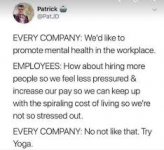desiderata
Member
Here is a template of what I suggested to management in which I have received more negative than positive responses:
EI
Employee Involvement
"This is the participation of employees discussing, brainstorming, and suggesting ideas for improvement, goal setting, and planning in order to help an organization fulfill its mission and meet its objectives. This involvement is based on the thinking that people involved in a process who know it best are more motivated to help themselves and the organization continuously improve."
EI
Employee Involvement
"This is the participation of employees discussing, brainstorming, and suggesting ideas for improvement, goal setting, and planning in order to help an organization fulfill its mission and meet its objectives. This involvement is based on the thinking that people involved in a process who know it best are more motivated to help themselves and the organization continuously improve."

